#COMM140
Explore tagged Tumblr posts
Text
INTRODUCTION AND PURPOSE
Welcome to TALK & TECH a space where digital communications are the bee’s knees!! I created this platform to discuss the provocations behind constructing online games, digital natives and reflective practices. Sounds pretty snazzy, huh? I don’t just want to share my opinion though … I want your input too! On each of my posts comment your opinion, thoughts and theories on these concepts. It’s super easy, as this blog is easily accessible to a wide range of users online.
TALK and TECH will be an eye opener for all of you many tech wiz’ out there! On that note, enjoy the ride ……
#COMM140#ACU#DIGITALTECHNOLOGIES#CONSTUCTINGONLINEGAMES#DIGITALNATIVES#TECHTALK#REFLECTIVEPRACTICES#TALKANDTECH#TALK&TECH#INTRODUCTION#PURPOSE#TECHSAVVY#OPINIONS
1 note
·
View note
Text
An Understanding of How Changes In Technology Impact On The Way Humans Communicate, And The Ethical Issues That Surround These Changes
In 2017 it is common for most people to come into contact with a digital device in their everyday life. People of the 21st century now rely on devices such as laptops, mobiles, and televisions day to day and have because autonomous to it. Always wanting the most up to date and fastest model of these devices it makes you really think of what are the ethical issues that surround these changes.
There are many concerns around these technologies whether it be social issues where people are so attached to their phones that without this device it may cause anxiety and even have sleeping issues due to being addicted to scrolling through their phone or the constant dependence on our mobile phones to solve all our problems rather than thinking for ourselves. (B.Wuensch, 2015)
Another issue surrounding the changes of technology is online bullying. People especially youths are now anonymous online and can create fake personas to torment others online. It is easier for others to bully somebody online as it is only a click of the button, there is no confrontation which makes the culprit feel like there is no wrong done. Bullying is not ethical and the victim often feels helpless and like there is no escape. With the changes in technology, it makes this faceless crime easier. (R.Vitelli, 2016)
There have been many positive impacts within technology but with the constant development, we have become so involved with the technologies that we have started to isolate ourselves, rather than living in the present moment we are sitting on our phones. These digital devices which were created to bring us together are now isolating us. (B.Wuensch, 2015)
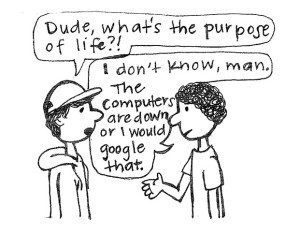
APA referencing and link:
Wuensch, Brianna (2015) 10 ways technology has negatively affected society. Retrieved https://www.theodysseyonline.com/10-ways-technology-negatively-affected-society
Vitelli, Romeo (2015) Does technology make bullying easier? Retrieved https://www.psychologytoday.com/blog/media-spotlight/201604/does-technology-make-bullying-easier
Image retrieved from http://sites.jmu.edu/gumniorfall131/how-much-technology-is-too-much/
5 notes
·
View notes
Photo
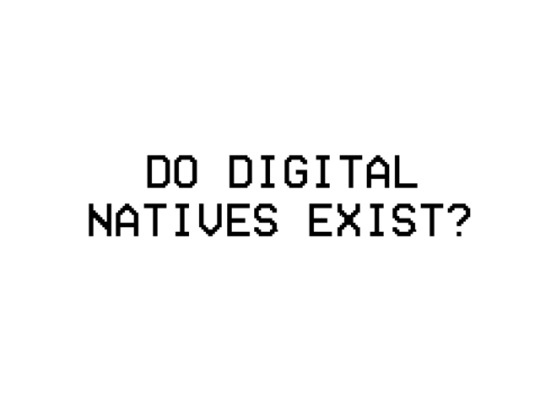
Do digital natives exist?
A digital native can be simply defined as someone who is unfamiliar with periods of time without digital technology, such as computers and the Internet. Revision of articles written by individuals, such as American writer and public speaker, Marc Prensky, establishes this understanding of the theory of who and what digital natives are, as well as ‘digital immigrants’ who adapted the age of digital technology later in their lives (Prensky, 2001).
Whilst there are individuals who do not believe in the idea of digital natives, I personally believe that the concept of ‘digital natives’ has a lot of evidence constructed by theorists like Prensky, who attempt to understand the changes that may need to be undertaken to be able to adapt education to the needs of newer generations (Gu, Zhu & Guo, 2011).
But what evidence has persuaded me enough to encourage me to agree with these scholars? The idea that there are individuals who find it difficult to relate and understand those who are technology savvy lead me to believe that this concept of digital natives is in fact true, and it can often seem as though these individuals have a different sense of communication and language to older generations. The way in which digital natives learn and receive information, as well as their preferences of digital media, is proven different to digital immigrants (Vercic & Vercic, 2013). However, although all digital natives are classified under the same term, those from different time periods are in fact quite different to each other. For instance, a digital native from 2001, when compared to a 2016 digital native, have both had different experiences with digital technology and therefore are more adapted to the form of media more prevalent within their own age. Finally, modifications made in schools, such as introduction of tablets in learning, demonstrates the differences in development between different digital natives, in which individuals have been allowed to flourish in a more modern sense.
Reference List:
Vercic, A T., & Vercic D. (2013). Digital natives and social media. Retrieved from http://www.sciencedirect.com/science/article/pii/S0363811113001215?via%3Dihub
Gu, X., Zhu, Y., & Guo, X. (2013). Meeting the “Digital Natives”: Understanding the Accepting of Technology in Classrooms. Retrieved from http://www.sciencedirect.com/science/article/pii/S0363811113001215?via%3Dihub
Prenksy, M. (2001). Digital Natives, Digital Immigrants. Retrieved from http://www.marcprensky.com/writing/Prensky%20-%20Digital%20Natives,%20Digital%20Immigrants%20-%20Part1.pdf
3 notes
·
View notes
Text
How changes in technology impact on the way humans communicate and the ethical issues that surround these changes?
Hello and welcome to the 3rd blog post of today’s topic. Today’s topic is: How changes in technology impact on the way humans communicate, and the ethical issues that surround these changes.
In today’s modern society where we live in the 20th century, most of our work gets done through using modern technologies such as laptops, tablets, phones and even perhaps on computers based on the Internet. With the use of new technologies, it can somehow have many effects on our live. One example of this would be the ways we communicate to our friends and families. One of the ways that technologies has effected on our daily lives are:
- The use of websites: using websites are one of the ways people can connect nowadays. Nearly the whole world population uses websites to connect with others and to read articles online. Going to websites, one of the ethical issues that surround this is that it prevents people from going out and seeing someone via face-to-face. With the existence of the new technologies, it makes us and everyone else’s lives easier. This is because of all the information we need is easier to find and access instead of having to wait amount of weeks for the newspapers to be published. Everything nowadays is based using online.
- The use of Phones: I think using phones allows people and everyone’s lives easier. Using phones is also another way to communicate with people on phone rather than seeing someone in person and talking with each other. One ethical issue behind this is that it can prevent people from communicating with each other. Using phones allows us to interact with our family members and friends and it is way to use speech language. The good side to using a phone is that it saves time and it is much easier to find and connect with others.
- Social networking: One of another ways that people use to connect and communicate with each other is through the use of social networks. Nowadays, in the young generation as high as age 18 and above should at least have 1 social network account. Whether it is Facebook, Twitter, Instagram, Snapchat, Google etc. Dating back in the centuries, a lot of communication was evolved through using different types of communication. That being said, it was also by far simple and intimate until later in the years, technology has changed the way how we connect, communicate, find love, search results (WiseLife, 2015).
The next part that will be mentioned is the ethical issues that these changes. What does ethics really mean when we talk about technology. Ethics is about rules and regulations, it is about values, doing bit of research, it also have moral principles that you can apply to, as well as ethical practices and rules of conduct. (Personal communication, September 1, 2017). The ethical thinking is based on The Universal Declaration of Human Rights (UDHR) (Personal communication, September 1, 2017). There are some of the ethical issues that can be noted are:
- Moral choices by the individuals in relation to their community
- Rules of governing members of a profession
- Standards of acceptable behaviour (Bayers, 2013)
Copyright and Intellectual Property: In this area, some confusions were made majority of the time by many people. This has been caused in regards to copyright and intellectual property rights. It is also how they apply to electronic files within new technologies. (Bayers, 2013)
The next ethical issue that can be found is Fair Use: What does Fair Use mean? According to the dictionary, it means ‘(in US copyright law) the doctrine that brief excerpts of copyright material may, under certain circumstances, be quoted verbatim for purposes such as criticism, news reporting, teaching, and research, without the need for permission from or payment to the copyright holder: whether or not six seconds of the song in a user-generated video constitutes fair use is something for a court to decide.’ In fair simple words, Fair Use is a critical to protect the intellectual property. In this ethical issue, it includes individual uses of copyrighted works and the development of new speech technologies. One of the issue in Fair Use is that one may make fair use of the copyrighted work without asking permission from the copyright holder. This is determined through using the copyrighted work which is within fair use depends upon four fair use factors. (Bayers, 2013).
The 3rd ethical issue is privacy policies, what is privacy policies?
- it is a statement or a legal document that disclose some or all of the ways a party gathers, uses, discloses, and manages a customer or client’s data.
Such as laws, policies and technological design, which is increasingly structuring people’s relationships whether it’s through social institutions or individual privacy that faces new threats and as well as opportunities. (Bayers, 2013). In addition to the idea of Privacy Policies, it is included with Electronic bulletin Board, OoVoo and Pocket.
There may be many more ethical issues that considered but as mentioned above are the most critical things that has happened in reality when it comes to technology.
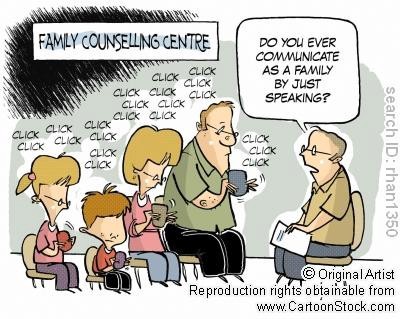

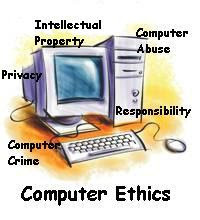
References:
WiseLife. (2015, March 15). The Evolution of Modern Technology [Video file]. Retrieved from https://www.youtube.com/watch?v=oKQ03sr6ryo
Darryl Jelley (2015, March 8).PROVIZORCA How New Technology Changes the Way We Communicate [Video file]. Retrieved from
https://www.youtube.com/watch?v=PrAHhyIoXck
Cathie Bayers. (2015, August 21). Legal and Ethical Issues and Modern Technologies [Video file]. Retrieved from https://www.youtube.com/watch?v=qbAXOmuqgew
Statement of Academic Honesty and screenshot
All work contained in this blog is my own except for where it is applicable and appropriate referenced. This includes ideas, opinion and images.
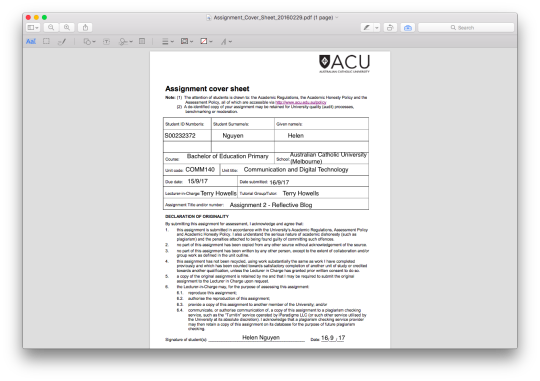
3 notes
·
View notes
Text
To tweet or not to tweet
BLOG #2
To tweet or not to tweet – that is the question. Week 3’s driving question introduced us to using social media as a platform to further our studies and our career. The driving question tells us that in some cases a professional online profile is a good thing to have, as many employers will look at these profiles when hiring. So when there is a questionable post you are thinking about putting out there its better to leave it.
This week also introduced us to Personal Learning Networks (PLN), which is networks such as twitter in which personal growth, and knowledge could be obtained. If a primary education student was to go onto twitter seeking information about teaching to better their studies there are many groups and people to connect to that can help in that department. This is also why a professional online profile is useful. To start us off on this PLN journey we were each given the task of creating our own personal twitter, follow some active educators and tweet ourselves in a professional manner.
From the start of our game design to now we are realizing more and more what we can do with the program scratch. As we test the gameplay capacity we have tweaked some aspects of our game. Rather than the cooperation aspect of our game being one user controls the gun and the other the movement, we've found that a up and down with a left to right movement system works better and is a more unique cooperation experience as it requires more communication.
3 notes
·
View notes
Text
Is there a difference between a 2001 digital native and a 2016 digital native?

(Kadle, 2011)
To answer this question, we must first understand what a digital native is.
According to Mark Prensky, digital natives are those who are “native speakers” of the digital language of computers, video games, and the internet. These digital natives have grown up with and have been exposed to a variety of digital technologies. I myself had never considered there could be a name for this until hearing about Marc Prensky’s terming of this phenomena, however, it has always been quite glaringly obvious that I, as a termed “digital native”, do have a different understanding of technology to my parents, and that my younger brother, has a different understanding again.
“We think and process information fundamentally differently from our predecessors.” (Prensky, 2001) Digital natives are used to receiving information fast and excel at multi tasking, this is greatly influenced by the use of the internet and widely available information, instead of books and other means of information. (Prensky, 2001).
There is a definite difference between 2001 digital natives and 2016 digital natives for numerous reasons. In 2001 modern computers were still very new to many people, expensive, slow, and had dial-up internet connections which meant that while information was still available at a higher volume and easier to find, it was much slower than the technology the 2016 digital native has at their fingertips. The amount of technology and the speed of it, with computers, smart phones, and tablets galore, with 4G data, and wireless internet, means that a 2016 digital native has been exposed to a much different experience.
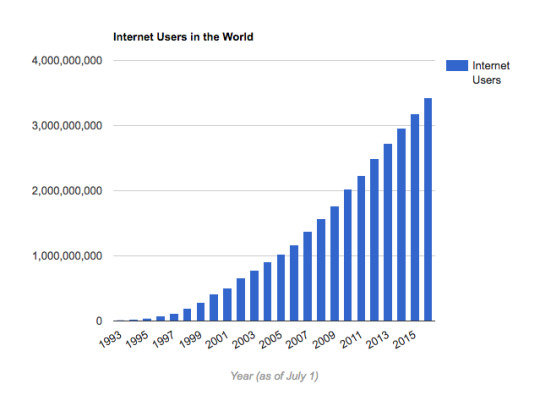
(Internet Live Stats, n.d.)
A 2001 digital native is far different from a 2016 digital native, and as technology is currently evolving and developing, and as new digital natives are born, the previous digital natives will become the digital immigrants, having to relearn and understand new technologies.

(Uni Check, 2015)
References
Internet Live Stats. Internet users. Retrieved from http://www.internetlivestats.com/internet-users/
Kadle, A. (2011). 5 Myths About Digital Natives. Retrieved from https://www.upsidelearning.com/blog/wp-content/uploads/2011/04/5-Myths-About-Digital-Natives.jpg
Prensky, M. (2001). Digital Natives, Digital Immigrants (pp. 1-6). MCB University Press. Retrieved from https://www.marcprensky.com/writing/Prensky%20-%20Digital%20Natives,%20Digital%20Immigrants%20-%20Part1.pdf
Uni Check. (2015). Digital Immigrants vs Digital Natives. Retrieved from https://unicheck.com/blog/wp-content/uploads/2015/09/pic21.jpg
2 notes
·
View notes
Text
RE-WRITTEN BOG POST
For our last blog post in unit Comm140, our blog post were to be assessed by our peers with written feedback. From this feedback, we would then have to re-write our post to improve the quality with as much reference to the feedback that was provided.
The blogger that provided me with feedback was:
Jack O’Neill... you can view his blog on https://comm14000.tumblr.com/
FEEDBACK on Blog Post 1 - Is there more to online games than fun?
Perhaps personal anecdotes that weren’t related to the Comm140 task that “Marcusfromcomm140” would have been of better use in a blog that is available for everyone to see, as this would have made the anecdote easier to relate to. Not everyone is doing a Bachelor of Education (Primary). “Marcusfromcomm140” however was successful in stating what makes a game fun, such as “needs to intrigue the user”, creating a “drive of wanting to complete it to the best of your ability” and “it needs to be challenging”. Also by gathering statistics from websites to support “Online gaming is an intensely social phenomenon, with millions of young adults and children around the globe interacting constantly” would have further improved the quality of this blog post.
Re-Written Blog Post
Well this is an easy question, with an easy answer… YES! Of course, the first thing that I think of an online game is that I am immediately drawn to the fact that it has to be fun, however that is not all an online game is. For example for my university course I am asked to create an online game in groups for children aged 7 -11, and whilst making this game I am realizing more and more about all the other relevant factors to making a successful online game. So apart from making it fun, it is crucial that a game must have an objective or a goal that users try to reach in order to complete the game, therefore not only must it be fun, it needs to be challenging. A successful game needs to intrigue the user into being determined to want to finish it… that is what makes a game addictive, that drive of wanting to complete it to the best of your ability and better than everyone else. Along with making an online game challenging, to ensure a successful game it must have a great story, as well as the games artwork being vibrant. With reference to “What Makes a Great Game?” by plural sight A successful online games needs to enforce users to become addicted to it, and in order to do that, not only must game be challenging but it need to look and sound attractive to draw people into it. You can view this article here on https://www.pluralsight.com/blog/film-games/what-makes-a-great-game-the-key-elements-of-successful-games. I believe that online gaming is an intensely social phenomenon, with millions of young adults and children around the globe interacting constantly, to not only play and have fun, but also to share information, challenge themselves and to interact to everyone around the world.
0 notes
Text
How Changes In Technology Impact On The Way Humans Communicate, And The Ethical Issues Surrounding These Changes (Rewrite)
There is no doubt that advances in technology have made a significant impact in altering our lives. Possibly many of us have come to find ourselves feeling like we cannot exist without technology. I do not totally condemn the effect of technology it has had on the world because technology has allowed us to do wonderful things we possibly didn’t think we could do years before.
The quality of face-to-face communication is suffering because of these gadgets that intercede our lives every day. Keller (2013) writes that according to Paul Booth, an assistant professor of media and cinema studies, social media has caused a “shift in the way we communicate; rather than face-to-face interaction, we’re tending to prefer mediated communication.” You will see that our children and youth of today, are embedded into their gadgets. Dr. Brent Conrad, a clinical Psychologist for TechAddiction, states that “72% of children have access to a computer at home” (2017). Their lives revolve and rely so highly on technology. The creation and effect of social media has opened a door for hackers, cyberbullying, mental and psychological issues, lack of privacy and other negative effects that are concerning and detrimental. Campbell (2017) states that research by two health organisations shows that, “poll of 14 to 24 year olds shows Instagram, Facebook, Snapchat and Twitter increased feelings of inadequacy and anxiety.” The youths health and well being is badly affected and is a problem that everyone needs to identify in order to help each other.
So let’s turn the leaf and recognise the beauty of the advanced technologies. Without technology, we would have no access to transportation, telephones, water and electricity that ultimately play a massive role in our lives. It’s improved on our education system where it has been embedded to improve student’s learning process and more visually fun. Technology has allowed amazing improvements in health care, as health care professionals are able to perform things that would have never been possible to do before. It keeps us and the world around us so involved and in touch, we even manage to see our family and friends who are half way across the world virtually through a screen. It allows us express ourselves in ways we probably never would have imagined.
Although there are negative impacts that technology has made, we cannot forget the better part in which the advances of technology has impacted our lives greatly better. It has allowed for different modes of communication and has opened the world of social media where we gain the freedom to express ourselves and brings unity to the world. It has made an amazing influential on our upbringing; we cannot deny the beautiful changes it has made on the human beings of today.
References
Campbell, Dennis. (2017). Facebook and Twitter Harm Young People’s Mental Health. Retrieved from
https://www.theguardian.com/society/2017/may/19/popular-social-media-sites-harm-young-peoples-mental-health
Conrad, Dr. Brent. (2017). Children and Technology – Stats for Technology in the Home. Retrieved from
http://techaddiction.ca/children-and-technology.html
Kelly, Maura. (2013). Social Media and Interpersonal Communication. Retrieved from
http://www.socialworktoday.com/archive/051313p10.shtml
Screenshot of the feedback from Wendy Luu
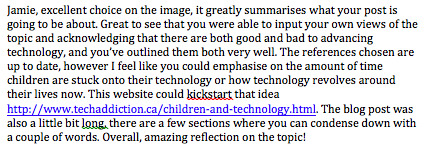
Copy of original critical reflection
There is no doubt that advances in technology have made a significant impact on the way we, as a society, communicate with each other and has altered all of our lives. Possibly many of us have come to find ourselves feeling like we cannot exist without technology. I do not totally condemn the effect of technology it has had on the world because throughout all these years, technology has allowed us humans to do wonderful things we possibly didn’t think we could do years before.
Technology and the digital world have never been more influential towards our lives. The advances of technology have allowed communicating much easier than it was before. Say goodbye to sendings letters, writing with a pencil or even reading the newspapers! I am sure we all have these hand sized screens in our pockets that can do the job! But let’s not get carried away and remember that there is also a downfall in that. Keller (2013) writes in her article that according to Paul Booth who is an assistant professor of media and cinema studies, social media has caused a “shift in the way we communicate; rather than face-to-face interaction, we’re tending to prefer mediated communication.” The quality of face-to-face communication is suffering because of these gadgets that intercede our lives every day. We have become so attached to our mobile phones, laptops or game consoles, we always feel the need to interact and accustom with them so we don’t miss a thing happening in the digital world. I cannot even begin to fathom the creation of social media and the effect it has made on human beings. It has opened a massive door for hackers, cyberbullying, mental and psychological issues, lack of privacy and other negative effects that are concerning and detrimental, especially of the youth in this day and age. Campbell (2017) states that according to research by two health organisations, “poll of 14- to 24-year-olds shows Instagram, Facebook, Snapchat and Twitter increased feelings of inadequacy and anxiety.” The youths health and well being is badly affected and is a problem that everyone needs to identify in order to help and support them, as well as each other. There are implications with the development of technology and the ethical issues that arise with it, but we definitely cannot forget the beauty of technology and the wonders it has offered for us in this world.
So let’s turn the leaf and recognise the beauty of the advanced technologies. Sometimes we tend to forget that technology actually plays a big part in as simple as living. Without technology, we would have no access to transportation, telephones, water and electricity that ultimately play a massive role in our every day lives. The development of technologies has made a great influence on our cultures, and how they are so imbedded into our health care and education. It’s improved on our education system and student’s learning process where it has been embedded to improve student’s education and make learning more visually fun. Technology has allowed amazing improvements especially in the health care aspect as health care professionals are given chances to perform things that would have never been possible to do before. It keeps us and the world around us so involved and in touch, we even manage to see our family and friends who are half way across the world virtually through a screen. It allows us express ourselves in ways we probably never would have imagined. We have to thank Facebook, Twitter, Instagram, Snapchat, Skype and other social media platforms for that (especially the amazing Google!)
Although there are numerous negative impacts in which technology has had on our society that we cannot ignore, we cannot forget the better part in which the advances of technology has made our lives greatly better. It has allowed for different modes of communication with each other and has opened the world of social media where we gain the freedom to express ourselves and keep in touch with each other. It brings unity to the world where we can overcome any barriers and it has made an amazing influential on our upbringing; we cannot deny the beautiful changes it has made on the human beings of today.
References
Campbell, Dennis. (2017). Facebook and Twitter Harm Young People’s Mental Health. Retrieved from
https://www.theguardian.com/society/2017/may/19/popular-social-media-sites-harm-young-peoples-mental-health
Kelly, Maura. (2013). Social Media and Interpersonal Communication. Retrieved from
http://www.socialworktoday.com/archive/051313p10.shtml
0 notes
Text
Welcome
https://docs.google.com/document/d/1Ydz27V2sjIo6M2-susZCvfYFCEV7k619A4W3Fi63O4c/edit?usp=sharing
Im a student at Australian Catholic University, doing a Bachelor of Primary Education. I’m in my first year. In my Unit COMM140 Communication and digital technologies, where I’m making a blog to share my ideas about education and technology. The importance they now have in this digital function world, where we can’t live without of technologies.
1 note
·
View note
Text
Blog Post 3- Week 8 Michaela Buscema
Critical Reflection: An understanding of how changes in technology impact the way humans communicate, and the ethical issues that surround these changes.
Technology without a doubt already has a substantial effect on reality, especially the ways in which humans communicate. In the current day, technology has grown progressively, which generates children already learning, and understanding technology in advanced ways. Today's society has a heavy reliance on technology in numerous amounts of ways, such as communication, work and how society runs. It's without a doubt that many people rely on technology, and it's only increasing and moving forward at a rapid pace. Although technology has an ever changing effect on society, there are ethical issues which surround the changes of technology, which will further be discussed.
Reflecting on the simple idea that technology has an impact on the ways in which humans communicate, it's understandable that different technological platforms impact human communication.Reflecting on the world global pandemic, it's evident that technology has positively impacted the ways in which humans communicate. Having a technological device for communication with friends and family allows the connectedness between people. Technology such as “digital media and videogames are undeniably affecting our culture, including the way we: Socialise, communicate, and how we think about the world” (Howells, 2020). This can be supported by research produced by Murdoch University, showcasing the ways in which technology is substantial for humans to communicate. “Although people have been using the internet to connect with others since the early 1980s, it is only in the last decade that social networking services have proliferated and their use has become a widespread practice - particularly amongst young people” (Horizon, 2009). It's evident that the growth of technology heavily impacts society, and has become the forefront of human communication. “Almost all young Australians are online with 90% of 16-29 year olds using the internet daily” (Collin, Rahilly, Richardson & Third, 2011).
Reflecting back on the quote presented by Collin, Rahilly, Richardson & Third (2011), “Almost all young Australians are online with 90% of 16-29 yeard olds using the internet daily”, it showcases that social media can have not only the positive impact of communication, but can arise negative impacts for not only the young generation but for anyone using social media. Ethical considerations that arise through the progressive change of social media, is showcased through cyber bullying. The Australian Institute of Health and Welfare discuss the impacts of cyberbullying and statistics showcasing the confronting impacts it has on children. “1 in 5 children experienced online bullying-like behaviours” (AIHW, 2020). With this high statistics presented at such a young age group, is concerning.
It is evident that digital technology has beneficial outcomes, in order for humans to communicate. Although, it showcases negative effects and ethical issues such as Cyberbullying.
References:
Howells, T. (2020). COMM140, A Theory of Fun- Games are fun, but is there more to them. [Powerpoint slides]. https://leo.acu.edu.eu
Collin, P., Rahilly, K., Richardson, I., & Third, A. (2011). The benefits of social networking services.
Australian Institute of Health and Welfare. (2020). Australia's children. Retrieved from https://www.aihw.gov.au/reports/children-youth/australias-children
0 notes
Photo

This website will not be stolen from any source without acknowledgment. The following ACU document states that every resource is appropriately recognized as I do not want to get fined, suspended or expelled for copyright issues. Thank you for reading this strict post.
Australian Catholic University (2017). ACU Cover sheet. Retrieved from http://handbook.acu.edu.au/handbooks/handbook_2016/faculty_of_health_sciences/approved_course_campus_offerings/postgraduate_courses?a=154914
0 notes
Text
Why do I need to become a Reflective practitioner? (Rewritten version)
When talking about reflection, sometimes people tend to get the wrong idea or meaning of what the term ‘reflecting’ is about. The idea of reflecting is all about looking back on something as such as looking back into the past whether it is a good or a bad impression. It also includes thinking about it and it also require thinking deeply. When people ask, ‘What is reflecting?’ Reflecting is based on a person that is thinking deeply about something which then leads to identifying issues. it also allows people to question their own opinions and thoughts which may be associated with it. Not only just that, it also combines the information that we have and apply through our learning. When reflecting on something, I believe that there is a process that we can follow based on reflective thinking. It is something that we can undertake when we as human beings reflect on something or reflecting on our past events. Sometimes, we don’t take notice of what is going around us.

One of the 4 main steps that I have learnt In COMM140, in week 4 lecture slides at The Australian Catholic University (ACU, 2016), the idea of reflection sums up the 4 main steps. One of them are: 1) Self Awareness 2) Critical Analysis 3) Synthesis and 4) Evaluation.
The first step in reflection is Self Awareness. in Self Awareness, it allows to us to explore what our reactions were. While in Critical Analysis, this is when we start to question ourselves by asking these questions with: “Why? How? or What if...?” By asking these questions will allow us to explore these feelings at a deeper thought. The third step is Synthesis. In this step, it allows us to connect the new knowledge and the significance that we have to our initial reactions. The last step is Evaluation. Evaluation is all about evaluating on what you have learnt and it is about seeing what comes next.
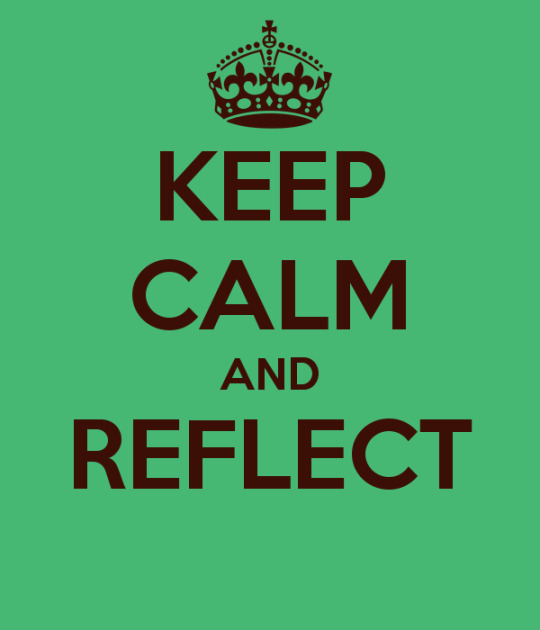
In my opinion, when it comes to reflection, the way how the language is used allows to reflect on something The three mains that examine the idea of reflection are: Affective responses, cognitive responses and behavioural. In other words, it is the language to attitude, emotion, and evaluation. (Personal communication, August 21, 2017). I believe that the language people use in their reflection in their everyday lives can be quite different as to how the essay or an essay response is written. One example of this is that I have used is First person among with few descriptive terms. The language I have also used is causal. If I use this same topic question but in an essay form, it would require similar information with some examples and evidence. Although, if it was in an essay response, it would not be in first person and it would not be casual. Instead, it would be more informative.
Overall, the main idea of this blog post is: Why do I need to become a reflective practitioner? The answer is, if i want to be the teacher that i want to be, i have to constantly reflect. This means that teachers will always have to reflect based on what kind of things that work well or what didn’t work well in the classroom area. Being a teacher means that they have to write down their goals in order to work progress towards them to ensure that their plans work well for next time and how they can make it better in order to get the best out of their children in their class.
Doing some reflection shows one of the main important things to do in reflective writing!
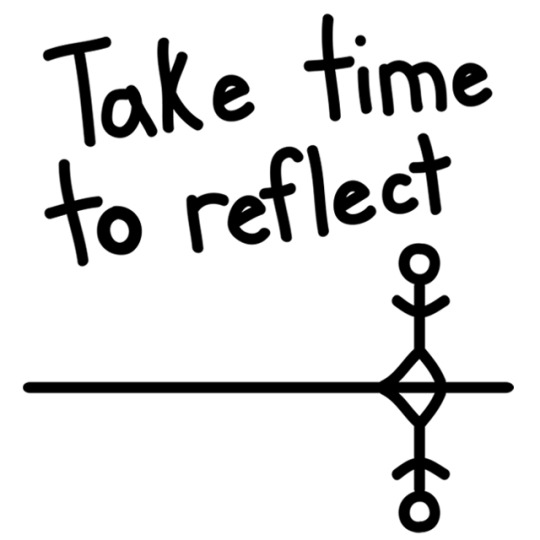
Reference:
Australian Catholic University. (2017). Week 4. Reflective Thinking. COMM140 Unit Materials. Retrieved August 21, 2017, from
https://leo.acu.edu.au/pluginfile.php/2435493/mod_resource/content/1/COMM104_ReflectiveThinking.pdf
Statement of Academic Honesty
All work contained in this blog is my own except for where it is applicable and appropriate referenced. This includes ideas, opinions and images.
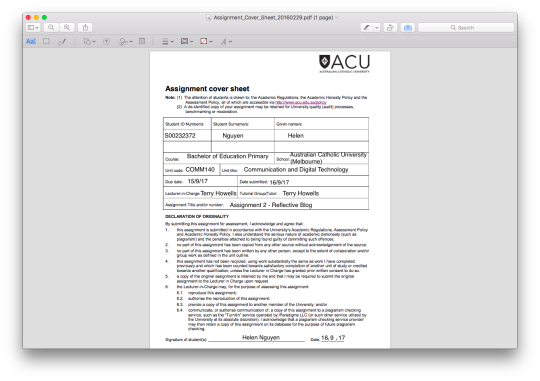
0 notes
Photo



BLOG #4
To tweet or not to tweet – that is the question. Week 3’s driving question introduced us to using social media as a platform to further our studies and our career. The driving question tells us that in some cases a professional online profile is a good thing to have, as many employers will look at these profiles when hiring. So when there is a questionable post you are thinking about putting out there its better to leave it. In my opinion not only is having a twitter account great for reaching out to people in your field but you must assure the profile of yourself is appropriate and inviting for employers.
Twitter is a social media platform where anyone can create an account and post their opinions, connect with like-minded people or share links of interesting websites to followers. If a primary education student was to go onto twitter seeking information about teaching to better their studies there are many groups and people to connect to that can help in that department. This is also why a professional online profile is useful. A Huffington Post article talks about how to utilize twitter when job searching. It states that following, retweeting and putting yourself out there to companies can be beneficial for an employee. This week also introduced us to Personal Learning Networks (PLN), which is networks such as twitter in which personal growth, and knowledge could be obtained. So not only can twitter be useful in obtaining a job but can also be a platform for improving in your field. To start us off on this PLN journey we were each given the task of creating our own personal twitter, follow some active educators and tweet ourselves in a professional manner.
In The Educators Guide to Twitter article, Twitter is talked about being beneficial for students as it, “provides students with opportunities to learn important skills, such as collaboration, responsiveness, and the ability to join different discourses.” It made me think that whilst social media can be a distraction in the classroom it could be helpful to teach students how to utilize it productively.
From the start of our game design to now we are realizing more and more what we can do with the program scratch. As we test the gameplay capacity we have tweaked some aspects of our game. Rather than the cooperation aspect of our game being one user controls the gun and the other the movement, we’ve found that a up and down with a left to right movement system works better and is a more unique cooperation experience as it requires more communication.
Briggs, S. (2015). The Educator's Guide to Twitter (Tools, Tips and Hashtags) - InformED. [online] InformED. Available at: http://www.opencolleges.edu.au/informed/features/twitter-in-education/ [Accessed 6 Oct. 2017].
Huffington Post Australia. (2015). How To Use Twitter To Find A Job. [online] Available at: http://www.huffingtonpost.com.au/entry/twitter-job-search_n_7571260 [Accessed 6 Oct. 2017].
0 notes
Text
To tweet or not to tweet?

(Moser, 2014)
After making a Twitter account you may frequently think to yourself, should I or should I not tweet/retweet this? The answer to this question comes down to some crucial points. Why was your Twitter account created, who is your audience, and what are you intending to gain from being in the “Twittersphere”.
If you have created your Twitter account with the purpose of using it as a Personal Learning Network, or PLN, then you should think twice before hitting that tweet button.
Your Personal Learning Network will be filled with professional colleagues and educators from around the world, and what you tweet will be seen by many of these people, so it is important to consider when tweeting something whether or not you should.

(Demma, 2014)
When tweeting you should consider the aspects of what a PLN incorporates. You should consider whether or not it will help you build connections and professional relationships with teachers, school administrators, university professors, and experts around the world. You should also take into consideration whether or not your tweet is sharing useful or helpful ideas and resources, and whether it contributes to collaboration, or the learning of fellow educators. (Graffin, n.d.)
If your tweet doesn’t tick any of these boxes off, maybe your tweet is best left to your own personal, private account, and if you still have trouble deciding whether or not you want to tweet/retweet something, ask yourself “would I be okay with my nana seeing this?”
References
Demma, C. (2014). PLN. Retrieved from http://colleendemma.blogspot.com.au/2014/02/personal-learning-network.html
Graffin, M. Step 1: What is a PLN?. Teacher Challenges. Retrieved 1 September 2017, from https://teacherchallenge.edublogs.org/pln-challenge-1-what-the-heck-is-a-pln/
Moser, P. (2014). To tweet or not to tweet. Retrieved from http://i3advantage.com/blog/2014/06/10/to-tweet-or-not-to-tweet-that-is-the-question/
1 note
·
View note
Text
An understanding of how changes in technology impact on the way humans communicate, and the ethical issues that surround these changes
Through the changes that have been brought with the development of digital technology, the act of communication has been made substantially more convenient for everyday people. Dating back to the 1800s when the original telephone was invented, the difficulty to actually get in contact with family and friends without sending a letter or being face to face is hard to imagine, as well as being highly expensive where only the rich would have access to a telephone. However, today we are truly lucky to live in a time where we can get in contact with whoever, whenever we want in an instant. Whether it is a text message, a phone call, an email or now just a message on Facebook via the internet. The changes of technology have not only enhanced the way people can communicate with family and friends but it also benefits businesses and other establishments as whatever actions are taking placed. With the benefits of such technology can also come with some liabilities, such as the ethical issues that come with the changes to technology. Making communication easier also makes bullying easier, as in the past coming home would be a safe place whether it was from school or work etc. Nowadays trouble can find you with a click of a button and the abuse and oppression follows you wherever you go. Another ethical problem raised though technology is a lack of privacy, similar to the bullying issue. Anyone from the public can find information about you if you are using the web, whether it is social media or through email or even blogs. So, aside from these minor setbacks, the pros far outweigh the cons from the changes in technology. The impact is definitely a positive one and I hope that technology can only advance further because in the end, how else would I be able to express my opinions through my blog ;)
0 notes
